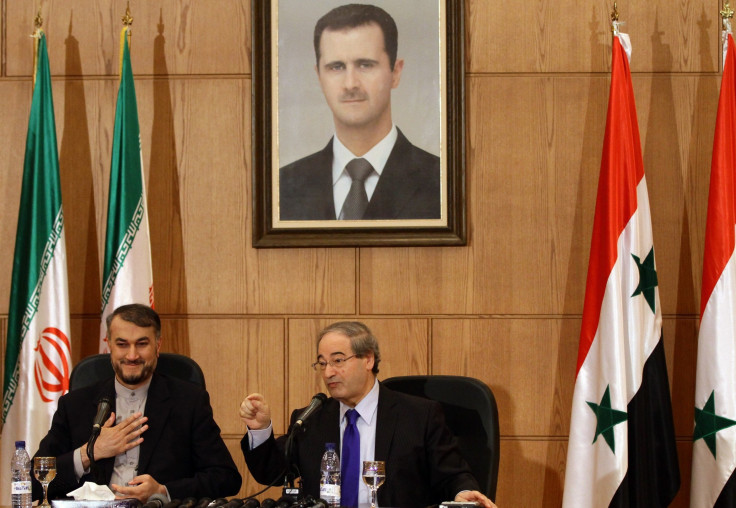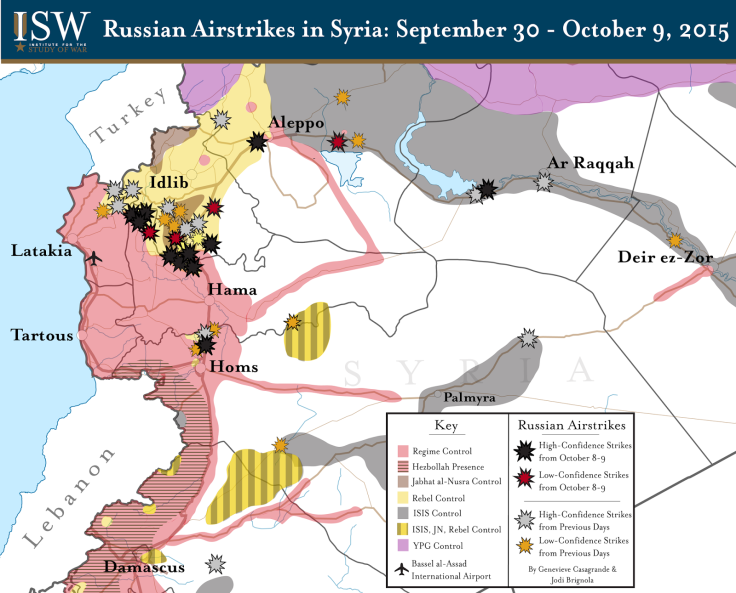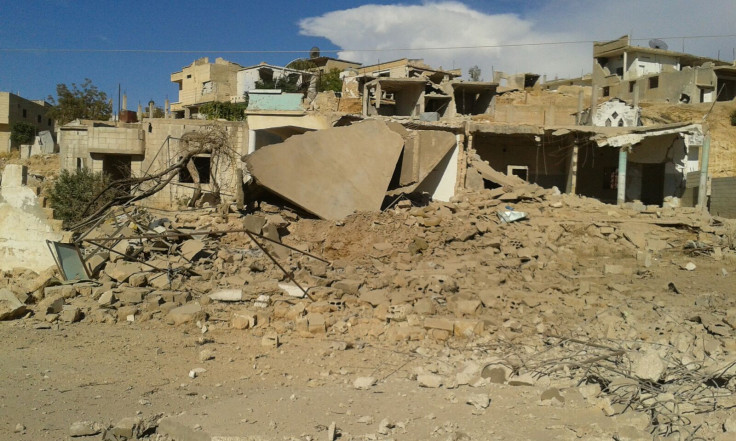Russian Airstrikes Will Hasten End Of Syrian War, Ensure Victory For Regime: Hezbollah Commander

BEIRUT -- After more than four years of gridlock fighting, forces loyal to the Syrian regime are convinced that Russian military action in Syria is the catalyst that will propel Syria’s civil war to the finish line. This seismic shift on Syria’s battlefields is not a foreshadowing of forthcoming peace in the country but an indicator that pro-regime forces and international powers backing President Bashar Assad – such as Russia and Iran — have abandoned the idea of a political solution to the conflict.
A high-ranking Hezbollah commander who operates several units in Syria told International Business Times: “Today I can tell you the solution is on the way. It’s going to be between Russia, Iran, Syria and Hezbollah. It’s going to be military, not political. We are going to win militarily and then it’s done.”
Ground advances by regime loyalists, including the Syrian army, Lebanese Hezbollah fighters, Iran-backed Shiite forces and other Iran-backed militias, are only possible, the commander said, with Russian airstrikes.
“It’s a simple strategy: Russia is striking and the infantry is advancing on the ground.”
Weakening the Islamic State group, commonly known as ISIS, was Russia’s initial justification for entering Syria’s civil war, but recent strikes have proven that rebel opposition forces are also a target, suggesting Russia’s unstated aim is to fight enemies of the regime.
Since the aerial campaign began two weeks ago, Russia has launched more than 100 airstrikes; Syria’s second-largest port city, Tartus, is home to a Russian naval base. The initial strikes have largely concentrated on aiding the regime to consolidate its territory in the north-south axis in the provinces of Damascus, Aleppo, Hama, Idlib and Homs.
A few days into the campaign, Russian warplanes began to target ISIS’ de facto headquarters, in the eastern province of Raqqa. According to the BBC, Russia claimed to have hit 55 ISIS targets in Syria in the 24 hours prior to Saturday.
The airstrikes, if successful, will help ground forces advance the Syrian regime’s hold over a strategically significant part of the country, paving the way for further gains in opposition-controlled areas.
The ultimate goal, according to Hezbollah, is to keep Assad in power. “Bashar Assad is the regime. [It’s a question of] ‘Are you with the regime or are you with Daesh? [Arabic acronym for ISIS]’” the commander told IBT.
Future Targets
Earlier this year, several rebel groups joined al Qaeda’s Syrian branch Jabhat al Nusra to form Jaish al Fatah (the Army of Conquest), a joint military operations unit that has overseen some of the most significant territorial gains for Syrian opposition since the start of the conflict.
The most notable victory for the Army of Conquest was the Idlib Governorate in northwestern Syria, the scene of some of the Syrian war’s most brutal battles. Senior figures in Hezbollah hope that Russian airstrikes will help the Iran-backed Lebanese Shiite group to win back Idlib for the regime.
“Our main target will be Idlib. By the end of next month we will be celebrating that Idlib is liberated," the commander said.

Iran will also be sending new fighters from its IRGC Quds force this week, according to the Hezbollah commander. They will be stationed in the southern province of Deraa.
New Allies
Syria, Iran and Russia are trying to cement their strategical lead by forming alliances with other factions fighting in Syria. In an effort to transmute military gains into political ones, under the premise of defeating ISIS, the Syrian regime, with the backing of Iran and Russia, has struck a deal with the Iraqi government to coordinate the fight against ISIS across the region.
Russia has also been negotiating with groups inside of Syria. Roughly nine months ago, the Syrian regime reportedly gave some Kurdish factions fighting in Syria control over the area between Hasakah, on the Turkish border, and the central province of Aleppo. The area is mainly under control of Syrian Kurdish People’s Protection Units (YPG) and the Turkish Kurdish People’s Protection Units (PKK), a U.S.-designated terrorist group.
“PKK came from Turkey and Iraq to Syria to help the Syrian Kurds,” the commander said. “They have weapons from Russia, Syria and Iran.”
Turkey has long feared that the conflict in Syria might give way to an independent Kurdish state on its border. The tension between Turkey and the Kurdish PKK militias heated up this summer after a set of PKK attacks broke the 2013 ceasefire between the Turkish government and the militant group. Days after the PKK attacks, the Turkish government launched a wave of bombings and an air campaign targeting PKK positions in both Turkey and Iraq.
If the PKK is helping their Syrian Kurdish counterparts fighting ISIS, it is only because the Syrian regime “gave Kurds some promises, like having freedom of speech, the right to govern themselves,” the Hezbollah commander said. What’s more, the PKK has consistently accused Turkey of supporting ISIS to target Kurdish factions.
Experts said the odds of a full-fledged Kurdish alliance with Syria is unlikely to stick, but that pro-regime forces realized long ago that the priority should not be to engage the Kurds in any battle.
“There have been notable tensions between the regime and YPG, but they’ve both been fighting ISIS,” Christopher Kozak, a Syria analyst at the Institute for the Study of War, told IBT.
“It’s possible that the regime has decided to de-prioritize fighting the Kurds.”

Russia has allegedly made similar overtures to the Syrian National Coalition (SNC), the political wing of the Syrian opposition, that have been accepted, according to Hezbollah. In return for seats in a future parliament, Russia has asked the SNC to join forces with President Assad in the fight against ISIS.
The SNC confirmed that Russia had approached them, but they denied any agreement had been made.
“We can’t accept any alliance that would include Assad,” Dr. Hisham Marwah, vice president of the SNC, told IBT. “We don’t believe Assad is serious about fighting ISIS.”
Experts are also skeptical of Russia’s claims. Kozak believes that Iranian and Russian intervention will only serve to prolong fighting instead of ending it.
“If the Iranians increase ground support, then it will enable the [regime] to make gains," he said. "But I think it will only extend the civil war.”
© Copyright IBTimes 2024. All rights reserved.












